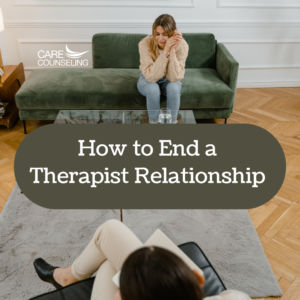How to End a Therapist Relationship
 Seeking therapy is a personal journey that can be immensely beneficial for your mental and emotional well-being. However, there may come a time when you feel that it’s necessary to end your therapist-client relationship. This decision, although challenging, is a valid aspect of the therapeutic process. In this blog, we will discuss the reasons for ending therapy and offer guidance on how to navigate this process with sensitivity and respect.
Seeking therapy is a personal journey that can be immensely beneficial for your mental and emotional well-being. However, there may come a time when you feel that it’s necessary to end your therapist-client relationship. This decision, although challenging, is a valid aspect of the therapeutic process. In this blog, we will discuss the reasons for ending therapy and offer guidance on how to navigate this process with sensitivity and respect.
Understanding the Need to End Therapy
Before we delve into the steps of ending therapy, it’s crucial to recognize why you might want to terminate the therapeutic relationship. There are several reasons for this, including:
- Goals Achieved: You may have successfully achieved the goals you initially set for therapy, and you feel that continuing therapy is no longer necessary.
- Incompatibility: Sometimes, despite a therapist’s expertise, you may not connect with them on a personal level, making it difficult to open up or make progress.
- Life Changes: Significant life changes, such as relocation, a change in financial circumstances, or a shift in your mental health needs, may necessitate ending therapy temporarily or permanently.
- Therapist’s Unavailability: If your therapist becomes unavailable due to unforeseen circumstances, you may need to find an alternative.
- Dissatisfaction: If you are not satisfied with your therapist’s approach, style, or the progress being made, you may consider seeking a different therapist.
Ending the Therapist-Client Relationship with Care
- Reflect on Your Decision:
Before taking any action, reflect on your decision to end therapy. Ensure it is well-considered and not driven by impulsive emotions. Discuss your thoughts and feelings with a trusted friend or family member to gain perspective.
- Consult Your Therapist:
Open and honest communication is key. Schedule a session specifically to discuss your decision to end therapy. Your therapist can provide insights, address concerns, or help you explore alternative solutions. This discussion can also provide closure and an opportunity to express gratitude for their support.
- Provide Adequate Notice:
Respect your therapist’s time and professional commitment by giving them adequate notice of your intent to terminate therapy. Typically, one or two sessions are appropriate, but this can vary depending on your therapist’s policies and your specific circumstances.
- Explore Transition Options:
If ending therapy abruptly is not suitable, discuss a transition plan with your therapist. This may include reducing the frequency of sessions, setting specific goals for the remaining sessions, or planning for future check-ins.
- Seek a Referral or Recommendation:
If your reason for ending therapy is due to life changes or dissatisfaction, ask your therapist for a referral or recommendation. They may be able to suggest other professionals who can better address your current needs.
- Closure and Gratitude:
Take time to acknowledge the progress you’ve made during therapy and express gratitude for your therapist’s support. Closure can help you leave the therapeutic relationship on a positive note.
- Prepare for Possible Emotions:
Ending therapy can evoke a range of emotions, including relief, sadness, or even anxiety about not having therapeutic support. Be prepared for these feelings and consider discussing them in your final sessions.
- Self-Care and Transition:
After ending therapy, focus on self-care and continue the practices and strategies you’ve learned. Remember that therapy is a tool for personal growth, and you can continue to apply its principles in your life.
- Reassess in the Future:
While you may be ending therapy now, it doesn’t mean you can’t return in the future if the need arises. Therapists understand that clients may need their services at different points in life.
Ending a therapeutic relationship is a significant decision, and it’s essential to approach it thoughtfully and respectfully. Your well-being and personal growth are the primary goals of therapy, and if ending the relationship aligns with those goals, it can be a positive step forward. By communicating openly with your therapist, providing notice, and considering transition options, you can navigate this process with care and gratitude for the support you’ve received on your journey toward emotional and mental well-being.



























